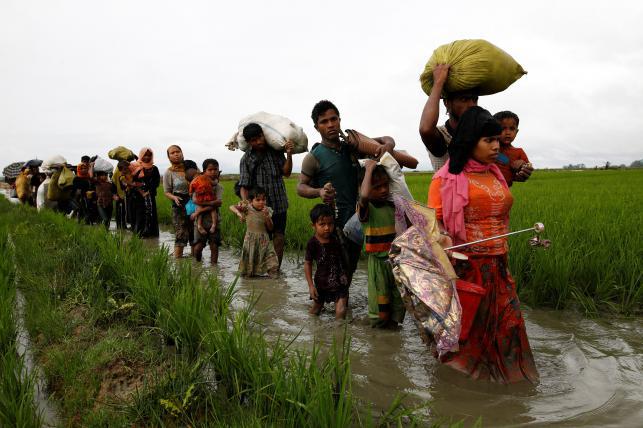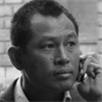Remembering Rohingya Survivors of Genocide in August
ASIA-UPDATES ON MYANMAR ROHINGYA GENOCIDE, 20 Aug 2018
Maung Zarni – Prothom Alo [Bangladesh]
Forgetting is a crime in the face of mass atrocities. So let’s remember the Rohingya victims this 25 August.

A group of Rohingya refugee people walk in the water after crossing the Bangladesh-Myanmar border in Teknaf. Reuters
18 Aug 2018 – My dear friend Gregory Stanton, the renowned American genocide scholar and former US State Department official, must be having déjà vu as news reports appear about Trump’s Secretary of State Mike Pompeo weighing the official use of that “sacred” term genocide. Greg lived through the Rwanda days when US State Department issued the directive to all US missions to say that “acts of genocide” may have been committed, but not to use the judicially loaded word “genocide”, while thousands of bodies of massacred and mass-raped-to-death Rwandan Tutsi piled up on the streets of Rwanda.
Twenty five years on, in the age of Facebook and Twitter, we have all voyeuristically witnessed the impact – if not the actual genocidal acts of mass killings, mass rape, mass communal destruction – of atrocity crimes (i.e., crimes against humanity, war crimes and the mother of all crimes, genocide) against Rohingya people by my country of birth that likes to be known as a “Buddhist country”.
Rohingyas, both Muslims and Hindus, neither pose as a threat to our “Buddhist” way of life, our China-controlled economy, or the military-controlled governing institution, nor have they launched separatist armed insurrections or embraced any terroristic fundamentalism. Their only “crime” is that they exist as a distinct ethnic community, a predominantly Muslim community, with their verified claim for a pre-colonial ancestral land which has become an integral region of the Union of Myanmar immediately adjacent to Bangladesh.
When a political state which defines itself mono-racially – as the Third Reich of the 1930’s and Israel of 2018 have done – attacks an ethnic, religious, national or racial group, with the clear or inferable intent to displace them at bayonet point and destroy them through various means at its disposal at varying speeds, such acts of displacement and destruction, both conceptually and in international law, this constitutes the crime of genocide.
If the crimes that Rohingyas have been subjected to are not considered legally or in policy discourses as genocide, in accord with the inter-state treaty – not simply a “soft” human rights law or a non-binding and un-enforceable principle (such as the Responsibility to Protect or so-called R2P), then Hitler’s Third Reich did not commit genocide against the Jews of the Nazi-occupied Europe or the other victims of the Nazi regime (including the Roma or “gypsies”, the Sinti, the Poles, the Russian, etc.)
When the exodus of terrorised, deeply traumatised and visibly exhausted hundreds of thousands – over 700,000 according to UN statistics – snaked their way across the 270 miles Myanmar-Bangladesh border in the months of August and September last year, the Myanmar government of Aung San Suu Kyi promoted a deliberately false narrative: that Myanmar security troops were engaged in counter-insurgency military attacks, or “security clearance operations”, to flush out the “terrorist” Rohingya group named “Arakan Rohingya Salvation Army” (ARSA) that allegedly launched “coordinated attacks” on police and security posts in 30 different locations, killing a dozen policemen.
This has been the narrative that the “international community”, including the Nobel-Peace-Prize-winning Amnesty International, have readily accepted. According to this official and global policy narrative, Myanmar has a right to self-defence as a UN member state, and the only problem is that the security troops have used “excessive force”, as if the violent acts by the young, desperate, rightly outraged Rohingyas of ARSA and half-million-strong, heavily-armed Myanmar Tatmadaw or Armed Forces and its auxiliary security units, hell-bent on systematically uprooting the existence of Rohingyas from over 300 villages, were on moral parity.
The debates in international human rights, legal and policy circles centre on whether there is a smoking gun – like SS Chief Heinrich Himmler’s Final Solution that would warrant the characterisation of “genocide”. Most of these debates and reportage indicate neither conceptual depth nor easily accessible historical contextual knowledge about either the decades-long persecution or Rohingya identity. One Thai academic, Thitinan Pongsudhirak, aired his genocide-denial in Myanmar-military-friendly Singapore’s Straits Times, while the British government repeatedly denies the genocidal character of Myanmar’s direct killings, mass gang rape and systematic destruction of hundreds of Rohingya communities in Western Myanmar. Myanmar’s Aung San Suu Kyi herself stands accused of whitewashing the genocidal crimes committed by her father’s military.
What is missing in all these depressing policy, academic, human rights and governmental debates, are Rohingyas’ voices – beyond crying as victims before cameras – that analytically and intelligently characterise their first-hand experience of genocide. If there is a group that knows genocide experientially – not simply in the judicial or academic sense of that loaded word – it is the Rohingya survivors of waves of genocidal expulsion, killings, rape, arson and displacement.
In his expert testimony before the Permanent Peoples’ Tribunal held at the Faculty of Law University of Malaya in Kuala Lumpur in September 2017, Greg Stanton bluntly said, “By the time the court arrives, the victims are all dead.”
There are over one million Rohingya survivors in Bangladesh from various waves of Myanmar’s mass expulsion and mass killings, who will not wait for the International Criminal Court or Trump Administration to bless them with the official juridical declaration that what they, the Rohingyas, experienced and survived, is genocide.
Of course, the dead of four decades of both the slow-burning genocide and the expedited large-scale destruction of Rohingyas, will not benefit from these legal determinations of the crimes that killed them en mass. But the survivors will most certainly feel vindicated if and when the above-mentioned influential bodies do the right thing by calling the crime by its very legal name “genocide”.
Meanwhile, we, the people of the world who are painfully aware of the genocidal nature of Myanmar’s crimes against Rohingyas, must extend our collective hand of solidarity to the Rohingya survivors – both in Bangladesh refugee camps and in diaspora, as well as in internal displacement camps inside Myanmar – as these extremely resilient, innocent and peaceful communities commemorate 25 August as Rohingya Genocide Remembrance Day. The Czech novelist Milan Kundera, exiled in France during the dark days of the Soviet totalitarian rule in the former eastern bloc, wrote pointedly that ‘forgetting (in the face of mass atrocities and systematic repression) is a crime.”
Free Rohingya Coalition, a global network of leading Rohingya activists and their international friends, have initiated a worldwide Remembrance Day to honour and memorialise countless numbers of Rohingya men, women, children and elderly who were murdered senselessly by Myanmar’s genocidal killers, both Rakhines and central government troops.
The world’s leading human rights and peace advocates including the Northern Irish activist Mairead Maguire, Gayatri Spivak, Tapan Kumar Bose, David Palumbo-Liu and a galaxy of rights activists and concerned citizens from Canada, Ireland, Bangladesh, Indonesia, USA, and all over, will be joining hands with the Rohingya survivors. On his part, UN Secretary General Antonio Guterres is reportedly holding a ceremony at the Security Council to record and remind the world of Myanmar’s heinous crime on 28 August 2018.
However empty the words “Never again!” have become for the UN member states that should know better, we, the people of this world, must not let our Frankensteinian and immoral states destroy our human spirit and universal compassion.
_____________________________________________
 A Buddhist humanist from Burma, Maung Zarni is a member of the TRANSCEND Network for Peace Development Environment, former Visiting Lecturer with Harvard Medical School, specializing in racism and violence in Burma and Sri Lanka, and Non-resident Scholar in Genocide Studies with Documentation Center – Cambodia. Zarni is coordinator for Strategic Affairs for Free Rohingya Coalition and an adviser to the European Centre for the Study of Extremism, Cambridge, UK. His analyses have appeared in leading newspapers including the New York Times, The Guardian and the Times. Among his academic publications on Rohingya genocide are The Slow-Burning Genocide of Myanmar’s Rohingyas (Pacific Rim Law and Policy Journal), An Evolution of Rohingya Persecution in Myanmar: From Strategic Embrace to Genocide, (Middle East Institute, American University), and Myanmar’s State-directed Persecution of Rohingyas and Other Muslims (Brown World Affairs Journal, forthcoming). He holds a PhD (U Wisconsin at Madison) and a MA (U California), and has held various teaching, research and visiting fellowships at the universities in Asia, Europe and USA including Oxford, LSE, UCL Institute of Education) , National-Louis, Malaya, and Brunei. He is the recipient of the “Cultivation of Harmony” award from the Parliament of the World’s Religions (2015).
A Buddhist humanist from Burma, Maung Zarni is a member of the TRANSCEND Network for Peace Development Environment, former Visiting Lecturer with Harvard Medical School, specializing in racism and violence in Burma and Sri Lanka, and Non-resident Scholar in Genocide Studies with Documentation Center – Cambodia. Zarni is coordinator for Strategic Affairs for Free Rohingya Coalition and an adviser to the European Centre for the Study of Extremism, Cambridge, UK. His analyses have appeared in leading newspapers including the New York Times, The Guardian and the Times. Among his academic publications on Rohingya genocide are The Slow-Burning Genocide of Myanmar’s Rohingyas (Pacific Rim Law and Policy Journal), An Evolution of Rohingya Persecution in Myanmar: From Strategic Embrace to Genocide, (Middle East Institute, American University), and Myanmar’s State-directed Persecution of Rohingyas and Other Muslims (Brown World Affairs Journal, forthcoming). He holds a PhD (U Wisconsin at Madison) and a MA (U California), and has held various teaching, research and visiting fellowships at the universities in Asia, Europe and USA including Oxford, LSE, UCL Institute of Education) , National-Louis, Malaya, and Brunei. He is the recipient of the “Cultivation of Harmony” award from the Parliament of the World’s Religions (2015).
Go to Original – prothomalo.com
DISCLAIMER: The statements, views and opinions expressed in pieces republished here are solely those of the authors and do not necessarily represent those of TMS. In accordance with title 17 U.S.C. section 107, this material is distributed without profit to those who have expressed a prior interest in receiving the included information for research and educational purposes. TMS has no affiliation whatsoever with the originator of this article nor is TMS endorsed or sponsored by the originator. “GO TO ORIGINAL” links are provided as a convenience to our readers and allow for verification of authenticity. However, as originating pages are often updated by their originating host sites, the versions posted may not match the versions our readers view when clicking the “GO TO ORIGINAL” links. This site contains copyrighted material the use of which has not always been specifically authorized by the copyright owner. We are making such material available in our efforts to advance understanding of environmental, political, human rights, economic, democracy, scientific, and social justice issues, etc. We believe this constitutes a ‘fair use’ of any such copyrighted material as provided for in section 107 of the US Copyright Law. In accordance with Title 17 U.S.C. Section 107, the material on this site is distributed without profit to those who have expressed a prior interest in receiving the included information for research and educational purposes. For more information go to: http://www.law.cornell.edu/uscode/17/107.shtml. If you wish to use copyrighted material from this site for purposes of your own that go beyond ‘fair use’, you must obtain permission from the copyright owner.
Read more
Click here to go to the current weekly digest or pick another article:
ASIA-UPDATES ON MYANMAR ROHINGYA GENOCIDE:
